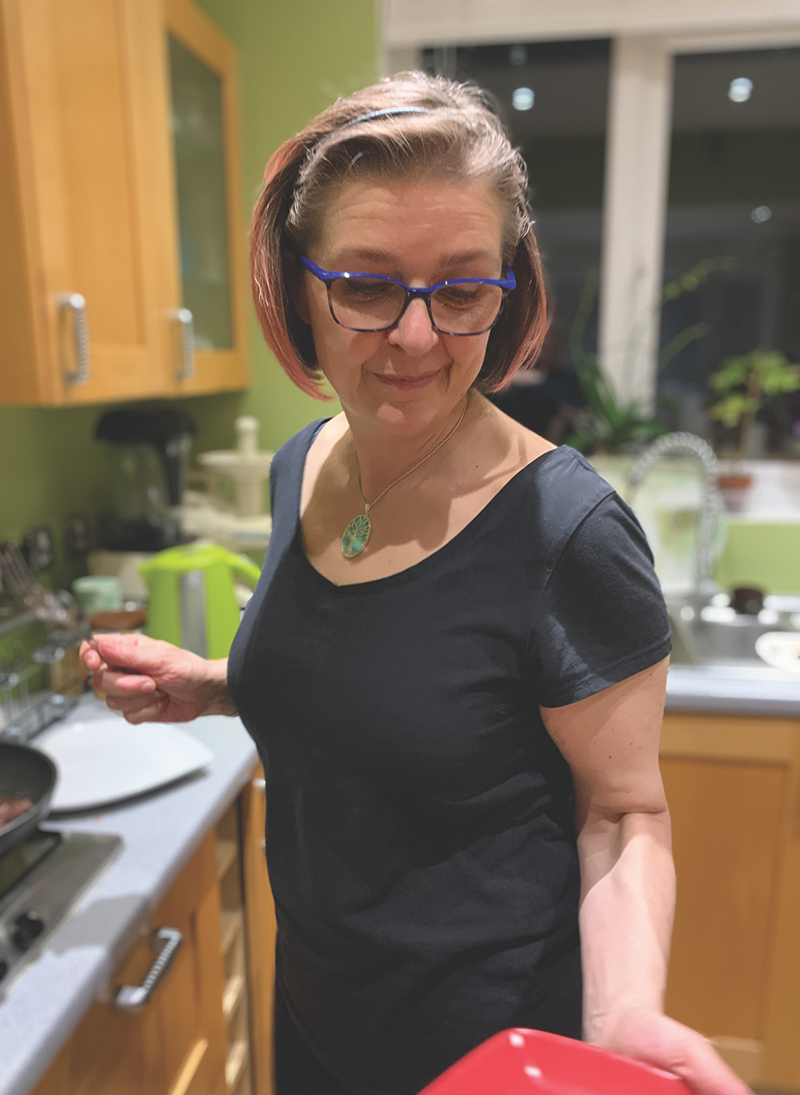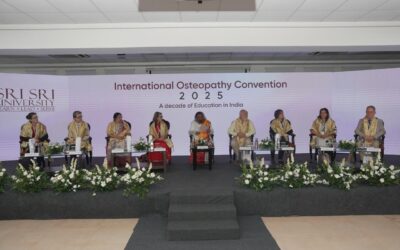SRI SRI University International Osteopathy Convention 2025
Thank you to everybody involved in putting together this wonderful celebration of 10 years of Osteopathy Education at SRI SRI University, India, in the presence of Gurudev Sri...
Fermented Blackberry Soda
For a homemade fun sparkling non-alcoholic lacto-fermented drink full of goodness! 75g of honey 250ml of Kefir Whey 1/2 lemon (sliced) 3 big handfuls of blackberries 1 Rosemary...
Wild Garlic Salt
Add a bit of fun to your cooking with some beautiful bright green flavoursome salt made with foraged wild garlic. This makes a wonderful wild garlic flavoured salt that you can...
Oxymel Bitter
This is a recipe borrowed and tweaked from Rachel de Thample, the fermentation expert from River Cottage. It's an old fashioned tonic based on vinegar that you need to dilute in...
Moelleux à la farine de châtaigne (Gluten Free Chestnut Cake)
Amaazing! A Fantastic easy light chestnut cake that everybody will love... 150g of chestnut flour 125g of unrefined sugar (Sucanat or coconut sugar) 100ml of raw milk 100ml of...
Host-Microbiota and the Immune system, a microbial perspective
By Laurence Fourdrignier DO, ND Host microbiota interactions are essential for the development of the immune system. Unfortunately, major changes in lifestyles, environments...

Welbeck School of Artisan Food
The Fermentation Larder – One day fermentation course at the Welbeck School of Artisan Food, taught by Laurence Fourdrignier
Welbeck School of Artisan Food
29 June 2024 Laurence will be exploring the nutritional advantages of fermentation, in addition to sharing her extensive knowledge of the processes that enable produce to be used...
The Fermentation Larder
17 June 2023 - One Day Course at The School of Artisan Food Join Laurence to delve more deeply into the benefits of fermentation. Exploring why we ferment, the economic...

Problems with your fermentation? Use the Help page to ask questions and find answers.
You can also ask about all things nutritional and osteopathic!
Osteopathy & Nutrition
New Patients
Initial consultation in osteopathy consists of a full case history taken, physical examination of the patient and physical treatment based on the diagnosis reached after examination. Following your initial consultation, it is also possible to book for a nutritional consultation
| Osteopathy new patient consultation (1 hour) |
|
| Sheffield | £78 |
| Worksop | £65 |
Osteopathy
Treatments can be focussed on just mechanics, however, osteopathy can be used to support the body’s physiology in all its aspects, digestion, fertility etc…
| Osteopathy follow-up treatment | ||
| 30 Mins | 45 Mins | |
| Sheffield | £58 | £70 |
| Worksop | £52 | £60 |
Nutrition
Following prior osteopathic examination, a dietary approach can then be tailored to the patient to specifically support the organs in need.
| Nutritional consultation (90 min) |
|
| Sheffield | £100 |
| Worksop | £100 |
Osteopathy Training
Laurence can offer bespoke training in Visceral Osteopathy and Nutrition to groups or individuals.
Learn more

About Osteopathy

Origins
Osteopathy came from Dr Andrew Taylor Still, over a hundred years ago. He was a medical doctor and his vision of Osteopathy was based on working with physiology via manual therapy.
Osteopathy
Visceral osteopathy is one of the tools of the osteopath. We look, assess and treat the whole body: the musculoskeletal system, the visceral system (all the internal organs), the fascial system, the cranial system, the fluid system (arteries and veins), the neurological system, looking at the physical biomechanical and neurological interactions.
The integration of all these systems is key. The body relies on pressure differentials in the various body cavities combined with the action of large fluid pumps such as the diaphragms to function. Combined with the various spinal curves, the whole system is designed as an efficient shock absorption system.
Self Healing
The body is a self healing mechanism, the osteopath puts the information in the body by affecting mobility of structures, stimulating neurology… the body alone does the healing. For example all your abdominal organs hang from the inside of your back, they are either suspended from it or stuck to it. Any congestion or mobility restriction of an organ will have a direct effect on the mobility of your back. This could then progress to a back injury, say if you tried to lift something heavy, simply because your back would be lacking the suppleness and flexibly on the side of the organ dysfunction.
Pain
Organs have a different pain innervation to your muscles. They do not give pain locally to the organ initially, instead they send the pain messages in other areas that have better pain innervation and that share the same nerve supply in terms of the spinal level, hence a Gallbladder problem is often initially felt as a right shoulder pain. If you have Irritable Bowel Syndrome, you most certainly have low back ache, particularly more so after long standing and towards the end of the day, and this will be worse in relation to the amount of bloating experienced.
Movement
To stay healthy, the body needs freedom in all movements. Just like a car engine, if the parts start to stick together, your car will start to break down. And just like for the car, an MOT once or twice a year is a worthwhile investment.
From working with the mechanics of the organs, it then becomes important to also look at the nutrition of the organ in order to improve function and mainly to sustain improvement. This is where diet and nutrition becomes important, as is physical and psychological environment too: mind, body and spirit…
Microbiome
The recent developments on the microbiome have equally now clearly demonstrated what is known as the Gut-Brain Axis, the link between your gut microbiome and your mental health. none of the concepts are new but the science is finally catching up and proving the old theories. We therefore now understand better the damage we have done and are still doing through drugs, foods and environment. This is where lactofermentation becomes an important healing tool for the gut microbiome and for the whole body.
Ferment Your Own



Hi, I’m Laurence
I came to England, from France, 30 years ago to train in osteopathy and then in naturopathy.
I teach Osteopathy at Post-graduate and Masters Level to Physiotherapists, Doctors and Osteopaths. I also run educational fermentation workshops.
Being French, I love food! After years of sharing recipes with my patients, friends and family I have finally compiled my favourite recipes along with some simple explanations of the microbiome and fermentation.
These are recipes that I use every day, they are all gluten-free, mostly dairy free, heavily plant-based, full of pre and pro-biotics!
I am currently teaching on several internationally acclaimed programmes:
Naturopathy / Nutrition Course Leader: College Belge d’Osteopathie (C.B.O.), Brussels
Visceral and Nutrition Lecturer: Women’s health osteopathic postgraduate training: Molinari Institute of Health (MIH), Wiener Schule für Osteopathie (WSO) : UK, Austria, Germany, Denmark, Switzerland, Italy, France.
Visceral Lecturer: Wiener Schule für Osteopathie (WSO), Vienna, Frankfurt – Undergraduate and Master’s program.
Naturopathic approach: Visceral Osteopathy, Nutrition and the Microbiome: UK, Europe and International Post-graduate courses
Lacto-fermentation workshop: Welbeck School of Artisan Food, Welbeck, and in the community

Talks and Workshops
Laurence often delivers locally run fermentation workshops and educational talks on health and the microbiome.
Courses in the community can be arranged and tailored to specific needs on demand.
Professional Training
Visceral or Nutrition courses can be tailor-made to suit previous experience/knowledge and length of the course desired. If you want to organise and have suitable facilities I’m happy to come to you, or you can see if your school can organise this.
If you want to arrange an event, course or workshop in your area
please email Laurence to discuss.










